Telangana SCERT TS 10th Class English Guide Pdf Unit 1C I Will Do It Textbook Questions and Answers.
TS 10th Class English Guide Unit 1C I Will Do It
Comprehension:
I. Answer the following questions briefly.
Question 1.
What is the ultimate aim of a bright student in this lesson? Why ?
Answer:
Usually the ultimate aim of a bright student is to join a good and prestigious institute and study there. In this lesson, the aim of the brighter student (Narayana Murthy) is to study in the Indian Institutes of Technology. These institutes maintain good standards and they are all prestigious. Hence a bright student wants to study in the IIT.
Question 2.
‘His heart sank in sorrow’ Whose heart sank in sorrow? Why?
Answer:
Narayana Murthy’s heart sank in sorrow. Because of the poor financial position Murthy’s father refused to send him to IIT. Through had passed with a high rank, there was no chance for him to study at IIT which was his dream. So, he was very sorrowful.
Question 3.
How did Murthy react when his father expressed his helplessness to send him to IIT?
Answer:
Murthy was disappointed. His heart sank in sorrow. He didn’t reply. His heart was bleeding but he did not get angry with anybody.
![]()
Question 4.
The author calls Murthy an introvert. Which action of Murthy substantiates this claim of the author about Murthy ?
Answer:
‘Introvert’ means someone who is quiet and shy, and does not share his feelings with other people. When Murthy’s father refused to send him to IIT, he felt disappointed and became sorrowful. But he never shared his unhappiness with anybody. He remained silent. That was an example to say that Murthy was an introvert by nature.
Question 5.
What, according to Narayana Murthy, can change the life of a person ?
Answer:
According to Narayana Murthy, a person himself can change his life by hard work. It is not the institution or any other thing that can change the life of a person. One’s life is based on one’s own efforts.
Question 6.
How does the motto, ‘Proved by intellect and driven by values’ describe Murthy’s life?
Answer:
Murthy gained success using his intellect and he was driven by values in reaching the peak level in his life. He worked very hard, and focussed on one thing, never bothering about his personal life or comforts. He shared his wealth with others.
He never used the help of any caste, community or political connections to go up in life. He earned wealth legally and ethically. He built a team of people who were equally good. Today he has become an icon of simplicity, uncompromising quality and fairness, apart from being a philanthropist.
Question 7.
What message does the writer have for educated youth who reach at a high position in the society by virtue of their education? Justify your view point with supporting evidence from the text ‘I Will Do It’.
Answer:
The message the writer has for the youth is that a person can reach high position by working hard focussing on his aim, never bothering about comforts, having intellect and moral values.
![]()
Question 8.
What was the philosophy followed by Murthy ?
Answer:
Murthy unknowingly followed the philosophy of the Bhagawath Gita : ‘Your best friend is yourself and your worst enemy is also yourself.’ He had confidence on himself and with hardwork, he went on to become a pioneer of India’s software industry and started the Information Technology wave.
Question 9.
Why was Narayana Murthy’s father sad ?
Answer:
Narayana Murthy’s father had to say ‘no’ to his bright son when the son told him that he wanted to join IIT. Theirs was a poor family and so he couldn’t afford his son’s expenses at IIT. Hence, his father was sad that he had to tell the bitter truth to his son.
Question 10.
What did Murthy’s father tell him when he told that he wanted to join IIT ?
Answer:
When Narayana Murthy told his father that he wanted to join IIT, his father told him that he was a bright boy and he knew their financial position. He also told that he had five daughters to be married off and three sons to educate. As he was a salaried person, he couldn’t afford his son’s expenses at IIT. He advised Murthy to stay in Mysore and study as much as he wanted. He said ‘no’ to his bright son.
Question 11.
What kind of a boy was Narayana Murthy ?
Answer:
Murthy was a sharp boy. He was the brightest boy in his class. His seniors used to ask him to solve their difficulties in Science. He could have gone unnoticed in a crowd, but once you asked him a question related to Physics or Maths, there was a spark in his eyes. He could understand theories of Science faster than the speed of light.
![]()
II. Given below are some sentences from the lesson. What do they tell us about Narayana Murthy’s qualities? Use the adjectives given in the box to describe Murthy’s character, you may also use some more adjectives you like.

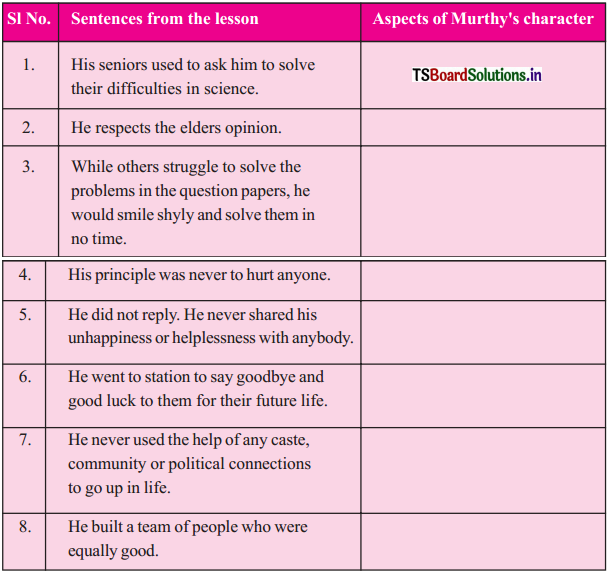
Answer:
| Sentences from the lesson | Aspects of Murthy’s character |
| 1. His seniors used to ask him to solve their difficulties in science. | bright |
| 2. He respect the elders opinion | obedience |
| 3. While others struggle to solve the problems in the question papers, he would smile shyly and solve them in no time. | obedience and brilliant |
| 4. His principle was never to hurt anyone. | gentle, kind |
| 5. He did not reply. He never shared his unhappiness or helplessness with anybody. | introverted |
| 6. He went to station to say goodbye and good luck to them for their future life. | encouraging |
| 7. He never used the help of any caste, community or political connections to go up in life. | philosopher and ethical |
| 8. He built a team of people who were equally good | uncompromising |
![]()
I. One-word Substitutes:
Look at the underlined words in the following sentences from the lesson.
1. Today he has become an icon of simplicity, uncompromising quality and fairness, apart from being a philanthropist.
2. He became a pioneer of India’s software industry and started the Information technology wave.
What is the meaning of ‘philanthropist’?
A philanthropist is one who devotes his service or wealth for the love of mankind.
Who is a pioneer?
A pioneer is a person who is the first to study and develop a particular area of knowledge, culture, etc. that other people then continue to develop.
You have observed that the meaning of a group of words is substituted with a word as in sentences (1) and (2). Words which replace a group of words or a full sentence effectively without creating any kind of ambiguity in the meaning of the sentences are called one word substitutes. The main purpose of using one word substitutes is to express the idea precisely and accurately.
Let’s look at some more one word substitutes.
| Word | Meaning |
| 1. Fatalist | A person who believes in fate |
| 2. Centenarian | A person who is above hundred years |
| 3. Omnipresent | One who is present everywhere |
| 4. Mercenary | A person who can do anything for money |
| 5. Misogynist | One who hates women |
| 6. Monogamy | A practice of having one wife or husband |
| 7. Autobiography | A life history written by oneself |
| 8. Biography | A life history written by somebody else |
| 9. Honorary | A position for which no salary is paid |
| 10. Ambiguous | A sentence whose meaning is unclear |
![]()
Tick (✓) the most appropriate one word substitutes for the following.
Question 1.
A person or thing that cannot be corrected
A) unintelligible
B) indelible
C) illegible
D) incorrigible
Answer:
D) incorrigible
Question 2.
A person of good understanding, knowledge and reasoning power
A) expert
B) intellectual
C) snob
D) literate
Answer:
B) intellectual
Question 3.
A person who knows many languages
A) linguist
B) grammarian
C) polyglot
D) bilingual
Answer:
A) linguist
Question 4.
one who possess many talents
A) versatile
B) prodigy
C) exceptional
D) gifted
Answer:
A) versatile
Question 5.
Words inscribed on a tomb
A) epitome
B) epistle
C) epilogue
D) epitaph
Answer:
D) epitaph
![]()
Project Work:
You have read about Nick Vujicic, who has accomplished every seemingly impossible thing In life despite having the most difficult form of disability. You have read about Narayana Murthy, who is one of the most remarkable examples to win over the unbeatable difficulties. You may also have heard or read about some remarkable Indian women such as Sudha Murthy, Sudha Chandran, Kiran Bedi and many other women who have crossed all the hurdles to become successful.
Work in pairs and make a list of qualities you like in your partner. Exchange in the list with your partner. Assess whether you want to add more words describing own qualities in it. All qualities are present in all of us, though some are better developed than others. Qualities help us live well and solve problems that we may come across in our lives.
Model Answer:
The qualities I like in my partner are hard working, sincerity, punctuality, honesty, helping nature, wisdom and such others. My partner also want almost all the same.
![]()
Check your personality:
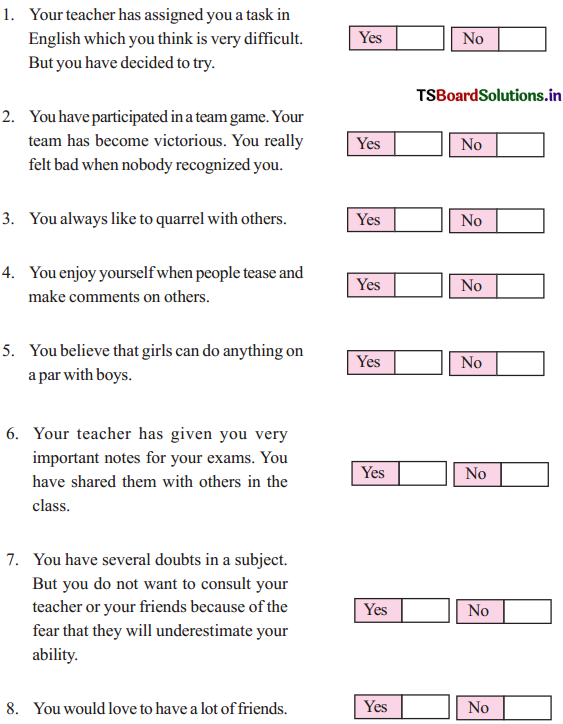
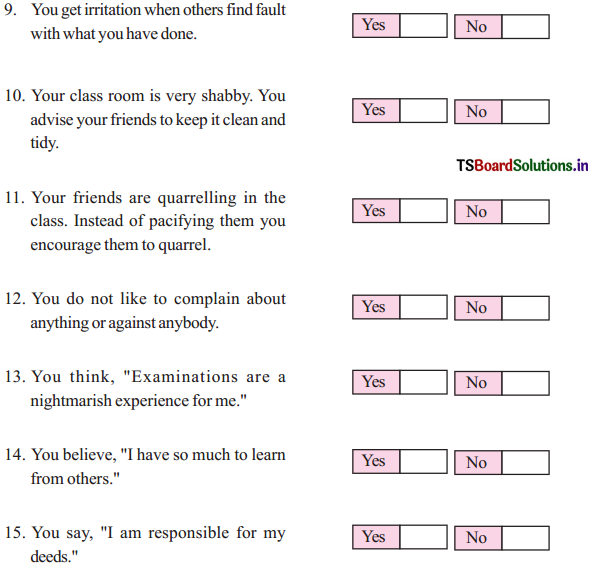
If you tick ‘Yes’ to the statements, 1,5,6,8,10,12,14,15 and ‘No’ to the statements, 2, 3, 4, 7, 9, 11, 13, you are a positive personality. Every ‘Yes’ or ‘No’ carries one mark each. For example, a person may say ‘Yes’ to three statements and ‘No’ to 2 of the above, his / her score will be 5/15. That means, he/she is 33% positive.
![]()
Self Assessment:
How well have I understood this unit?
Read and tick (✓) in the appropriate box.
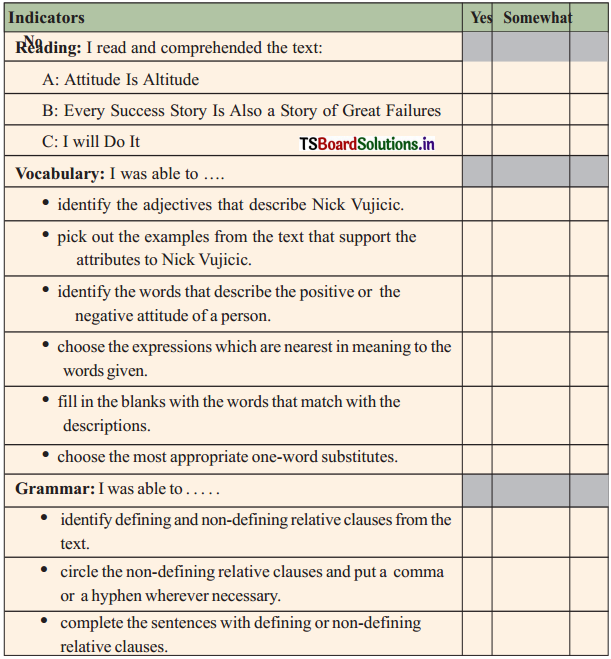
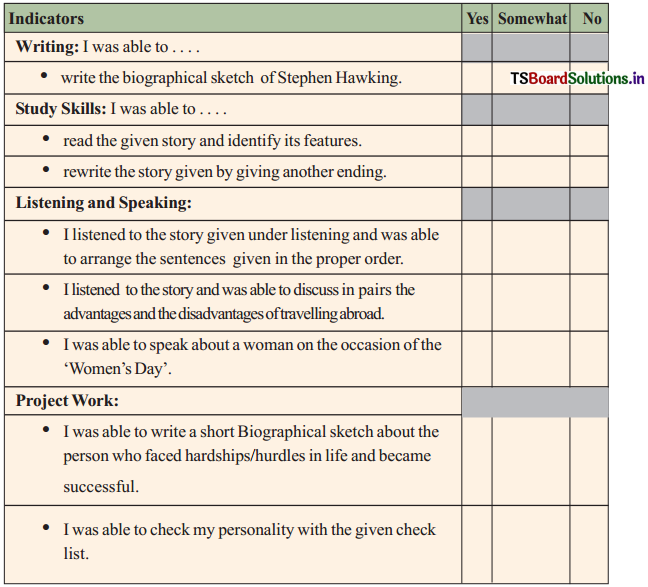
![]()
I Will Do It Summary in English
Nagavara Ramarao Narayana Murthy is the founder of Infosys, a leading IT company in the world. He is an icon of simplicity, uncompromising quality and fairness. He devotes his service and wealth for the welfare of mankind. He became a pioneer of India’s software industry and started the Information Technology wave.
When Murthy was a child, he was very sharp. He was very much interested in Physics and Maths. He could understand theories of science easily. His father was a high-school teacher and an eager reader of English literature. His aim was to study at an IIT. He applied for the entrance test along with his friends.
He acted as the guide for the others. He would easily solve the problems with which his friends struggled. He always dreamt of studying at IIT. He did well in the test and passed with a high rank. He was thrilled and went to his father with delight.
When he told his father that he wanted to join IIT, his father said ‘no’, telling him about their poor financial position. His father advised him to stay in Mysore and study as much as he wanted. He was sad to say this to his bright son.
The teenager was disappointed and his dreams had burnt to ashes. He was sorrowful but didn’t get angry with anybody. He was an introvert. The day on which his classmates were leaving for Madras (Chennai), he went to the station to say good bye and good luck to them. Though all his friends were excited and discussing their new hostels, new courses etc., he stood there silently. He wished all of them standing there even after he could no longer see the train.
He stood there motionless. He decided to change his life by hard work. He followed the philosophy of the Bhagavath Gita ‘Your best friend is yourself and your worst enemy is yourself’. He worked very hard, and focused on one thing, never bothering about his personal life or comforts. He shared his wealth with others. He earned all his wealth legally and ethically.
![]()
About the author:
Sudha Murthy, the wife of N.R.Narayana Murthy, is an Indian social worker and author. Murthy began her professional career as a computer scientist and engineer. She is the chairperson of the Infosys Foundation. She has founded several orphanages, participated in rural development efforts, supported the movement to provide all Karnataka government schools with computer and library facilities, and established the ‘The Murthy Classical Library of India’ at Harvard University.
Murthy also teaches Computer Science Composed fiction “Dollar Sose”. The present story is an extract from one of the most successful stories ‘How I Taught my Grandmother to Read & Other Stories.’
Glossary:
mandap (n) = a raised platform;
Anna (n) = a word used to address a respecteble elder or older male,
D-Day (n0 = a date on which something important is expected to happen. (From the name given to June 6, 1944, the day on which the U.S., British, and other armies landed on the beaches of northern France in the Second World War.);
Icon (n) = a famous person or thing that people admire and see as a symbol of a particular idea, way of life, etc;
philanthropist (n) = one who devotes his service or wealth for the love of mankind;
avid (adj) = eager;
aspirant (n) = person who is ambitious;
ultimate (adj) = beyond which no other exists or is possible;
afford (v) = be able to buy or do ;
expenses (n) = money spent in doing a specific job, or for a specific purpose;
fondest (adj) = most affectionate; having a great liking for somebody or something;
drizzle (v) = rain in many fine drops;
ethically (adv) = morally,
grasp (v) = understand something,
implied (v) = gave the meaning,
burnt to ashes (idiom) = lost hopes
introvert (n) = a quiet person who is interested in his/her own thoughts and feelings.
chirping (v) = making short high sounds
set in (phr-v) = begin
pioneer (n) = a person who is first to do something.